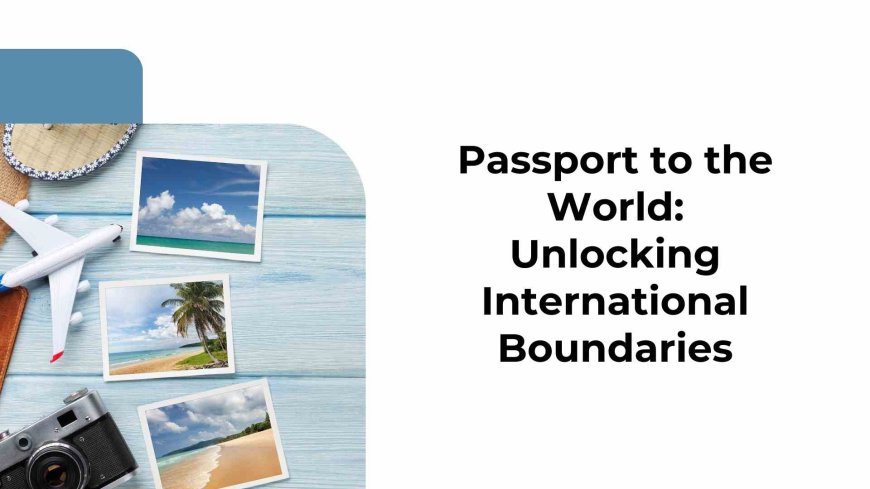Passport to the World: Unlocking International Boundaries
Passport Registration Online generally refers to the process of formally recording or registering your passport information with relevant authorities or institutions

Passport Registration Online generally refers to the process of formally recording or registering your passport information with relevant authorities or institutions Traveling to different countries is an exciting adventure. However, crossing international boundaries requires a key item: a passport. This small booklet holds the power to unlock the doors to other countries, enabling people to explore the world beyond their home borders. Understanding the importance of a passport, how it works, and its role in international travel is essential for anyone who dreams of global exploration.
The Importance of a Passport
A passport is more than just an identification document. It serves as proof of citizenship and identity, confirming that the holder is a legal member of a particular country. When traveling internationally, a passport is often the only accepted form of identification, making it crucial for crossing borders. Without a passport, entry into most countries is not possible, limiting one's ability to experience different cultures, landscapes, and societies.
Moreover, a passport is a tool that enables global mobility. In an increasingly interconnected world, the ability to move freely between countries is vital for personal growth, business, education, and cultural exchange. A passport empowers individuals to access opportunities abroad, whether for work, study, or leisure, fostering a more interconnected and understanding global community.
How a Passport Works
A passport contains vital information about the holder, including their name, photograph, nationality, date of birth, and signature. This information is essential for verifying the identity of the traveler at various checkpoints, such as airports, border crossings, and embassies. Passports also include a unique identification number and, in many cases, a microchip that stores biometric data, such as fingerprints or facial recognition features, adding an extra layer of security.
When entering or leaving a country, immigration officials check the passport to ensure that the traveler is authorized to cross the border. They may also stamp the passport, recording the date and location of entry or exit. These stamps serve as a travel log, documenting the holder's international journeys.
In addition to serving as an identification document, a passport may also require accompanying visas for entry into certain countries. A visa is an endorsement or stamp placed inside the passport by the destination country’s authorities, granting permission to enter, stay, or work in that country for a specific period. Depending on the destination and the purpose of the visit, visas may be required in advance or issued upon arrival.
Types of Passports
Passports are not one-size-fits-all; they come in different types, each serving a specific purpose:
1. Regular Passports: These are the most common type, issued to citizens for general international travel. They are used for vacations, business trips, or any other travel purposes.
2. Diplomatic Passports: Issued to diplomats and government officials, these passports provide special privileges and immunities while on official business abroad. Holders of diplomatic passports often enjoy expedited processing at borders and may be exempt from certain visa requirements.
3. Official Passports: Similar to diplomatic passports, these are issued to government employees traveling on official duty. However, they do not offer the same level of privileges as diplomatic passports.
4. Emergency Passports: Also known as temporary or limited validity passports, these are issued to citizens who need to travel urgently but do not have a valid passport. Emergency passports are usually valid for a short period or a single trip.
5. Family or Group Passports: In some countries, a single passport can be issued for a family or a group, particularly when traveling together. However, this practice is becoming less common as individual passports are now standard.
The Evolution of Passports
The concept of a passport has evolved significantly over time. The earliest forms of travel documents date back to ancient civilizations, where letters of introduction or safe conduct were issued to travelers to ensure their safe passage through foreign lands. The modern passport system began to take shape in the early 20th century, following the end of World War I, when countries started to formalize border controls and require standardized travel documents.
Today, passports have become more sophisticated, incorporating advanced security features to prevent fraud and ensure the authenticity of the document. Biometric passports, which include an embedded microchip containing the holder's biometric data, are now standard in many countries. These advancements have made international travel more secure and streamlined, reducing the risk of identity theft and document forgery.
Note: You can also Apply for Passport Renewal from our website
Conclusion
A passport is more than just a travel document; it is a gateway to the world. It allows individuals to cross international boundaries, experience new cultures, and access opportunities that would otherwise be out of reach. Understanding the importance, functionality, and responsibilities associated with a passport is crucial for anyone looking to explore the globe. As the world becomes increasingly connected, the role of the passport will continue to evolve, ensuring that people can navigate the complexities of international travel and unlock the potential of a globalized world.












